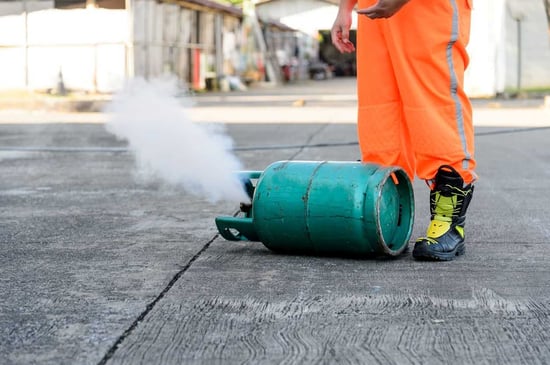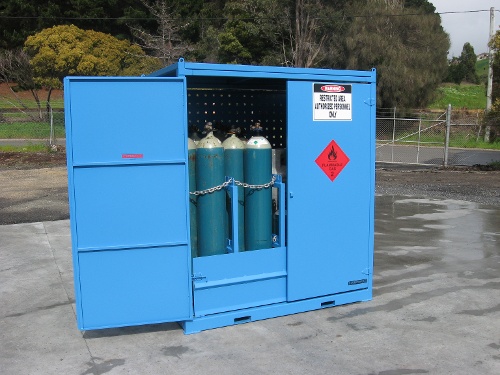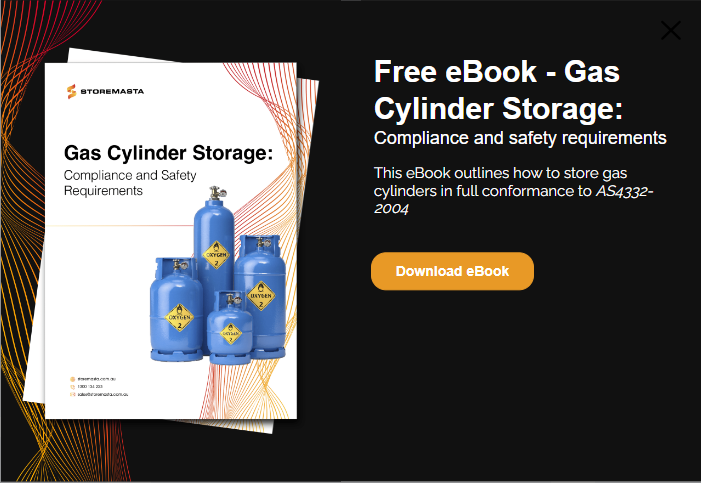Here at Storemasta, we take gas cylinder safety seriously and want to make sure accidents are avoided when staff are handling compressed gases. Whether it’s an accidental release of compressed gas or a dropped cylinder impacting staff members, there are many hazards to consider when working with gases. Here, we’ll look at 3 deadly mistakes that can occur when staff are handling compressed gases in cylinders. We’ll also provide some simple tips so you can avoid incidents like this occurring in your own organisation.
#1. Not Following Procedures
A worker was checking cylinders for leaks when one of the cylinders began to rapidly dispense gas. As the cylinder was loose, the uncontrolled release of the gas propelled the cylinder into the air, sadly killing the worker.
AS 4332 - The storage and handling of gases in cylinders requires that all gas staffing procedures include instructions on the applicable safety regulations and safe handling procedures.
In this case the worker should have known and made sure that each gas cylinder was:
- Stored upright
- Individually restrained with a safety strap or chain
- Stored with the valve closed and cylinder cap in place
Had these three requirements all been followed and the cylinders correctly restrained — it is unlikely the accident would have occurred the way it did. It’s of critical importance to operations that work with gas cylinders that procedures are developed and followed to reduce gas storage risk.
Introducing Correct Gas Storage
This example of a gas cylinder accident isn’t about establishing blame — it’s about analysing an incident to reduce the likelihood of it occurring again.
We recommend that you systematically train your team to:
- Correctly store and restrain cylinders
- Check that restraints are in place before conducting maintenance work
- Rectify or report gas cylinders (depending on their job role) not stored or restrained properly
This gas cylinder training will give them the skills to safely store gas cylinders to reduce the likelihood and impact of hazards.
Compliant gas storage is essential for the health and safety of staff. However, team members must be trained in the correct storage and handling procedures.
#2. Not Using Correct Gas Handling PPE
A worker was changing an LPG cylinder on a forklift when the gas began to rapidly disperse. Wearing only cotton gloves, he grabbed the cylinder and tried to close the valve. He received frostbite injuries and 2nd degree burns from the liquified gas.
We often hear the question, ‘Can LPG gas kill you?’ This incident is just one example of the deadly consequences associated with LPG cylinders in an organisation. LPG is recognised as a Class 2.1 Flammable Gas that can displace oxygen and cause asphyxiation. However, LPG also presents a thermal hazard. If staff make contact with LPG gas through an accidental release on bare skin, it can result in cold burns, similar to frostbite.
Therefore, this worker should have been wearing cold insulating gloves when breaking transfer connections. Of course, we have no idea whether this worker was only given cotton gloves to wear or if he was improvising because he had lost or forgotten the correct PPE.
Providing Suitable Gas Handling Personal Protective Equipment
Organisations must provide Safety Data Sheets (SDSs) for each gas onsite. Staff must also be provided with the correct personal protective equipment so that they can handle the gases safely.
You must then implement adequate gas bottle training so that your staff and contractors know:
- The chemical properties of the gases onsite
- The correct PPE required and how to use it
- How to find the correct equipment (ie PPE storage)
- How to maintain and care for their PPE
- What to do if PPE is damaged or missing
As we mentioned earlier in this post, it’s of critical importance that team members are trained to understand all the hazards associated with gas cylinder handling – and how to mitigate these hazards with controls, such as personal protective equipment.
Staff must be aware that missing or damaged pieces of PPE must be returned to the relevant person so that the equipment can be replaced or repaired prior to use. Gas staffing requires suitably equipped personnel who are wearing the correct PPE for the hazard class of the gas, as well as equipment in good condition and fit for purpose.
#3. Not Fully Understanding Compressed Gas Hazards
Three workers were carrying LPG cylinders they had unloaded from a truck down some stairs. One worker slipped and dropped the cylinder. It was propelled forward down the stairs striking another worker in front who was also carrying cylinders. Two of the workers were killed and the other seriously injured from the subsequent explosion as the cylinders impacted one another.
This terrible accident could have been avoided if the requirements of AS 4332 - The storage and handling of gases in cylinders had been followed; and the cylinders were unloaded and handled using mechanical lifting devices.
Training Staff to Identify and Manage Gas Cylinder Hazards
Staff may deviate from operating procedures and safe work methods because they don’t fully understand the compressed gases they are handling.
Make sure your team are provided with:
- Mechanical lifting devices and gas bottle trolleys to move gas cylinders safely
- Training so staff know how to use the equipment correctly and not deviate from standard operating procedures
- Extensive experience with the equipment in different scenarios, so staff are comfortable using the mechanical lifting devices in different circumstances
- A clear understanding of the dangers and risks to their personal safety while handling gas cylinders

Hazardous situations can be avoided with the correct handling and storage training.
Gas Cylinder Safety for Organisations
For more advice on how to avoid workplace accidents — and train your staff to safely store and handle gas cylinders — download your copy of Storemasta’s free eBook. Gas Cylinder Storage: Compliance and safety requirements details the gas cylinder storage requirements in clear, easy-to-understand language. Access your free copy today to learn more about gas cylinder safety.
Joining the team as a Dangerous Goods Storage Consultant, Melissa Hampton became Storemasta's Marketing Manager in late 2021. With extensive knowledge and experience in chemical compliance, Melissa is responsible for leading the Marketing team and helping shape their marketing strategy. In her spare time, you can find Melissa hiking, swimming and enjoying the great outdoors in beautiful north-west Tasmania.

